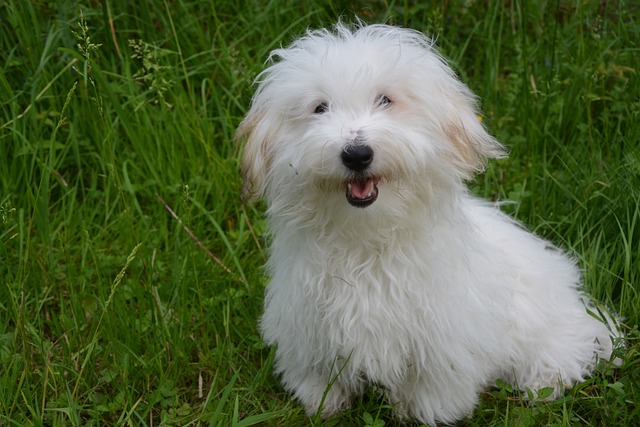


The Coton de Tulear is a small, cheerful, and affectionate dog breed known for its soft, cotton-like coat and sweet personality. Originally from Madagascar, this breed is prized for its charming disposition and suitability as a companion animal. Coton de Tulears are often described as "little clowns" due to their playful and friendly nature. They are highly social dogs that thrive in family environments and enjoy being the center of attention. Despite their small size, they are known for being sturdy and resilient, making them great pets for families, singles, and seniors alike.
The Coton de Tulear has its origins on the island of Madagascar, where it was historically kept as a companion dog for royalty and nobles. The breed’s name comes from the city of Tulear (now Toliara), which is located on the southwestern coast of Madagascar. The "Coton" in the breed's name refers to its distinctive, soft, cotton-like coat. It is believed that the breed was brought to Madagascar by French sailors in the 16th century, and over time, it became a beloved companion dog, particularly for the island's aristocracy. The Coton de Tulear was kept mainly as a lap dog and companion, but it was also used for hunting small game. The breed became more widely recognized in the United States in the 1970s and was officially recognized by the American Kennel Club (AKC) in 2014.
The Coton de Tulear is a small dog breed, typically standing between 9 to 11 inches tall at the shoulder and weighing between 8 to 15 pounds. They have a well-balanced, sturdy build that is both compact and agile. The most striking feature of the Coton de Tulear is its long, fluffy coat, which is soft, cottony, and often white or cream in color, though some may have a bit of black, tan, or other markings. Their coat requires regular grooming to prevent matting and tangling. The Coton de Tulear has a rounded head, dark, expressive eyes, and a sweet, alert expression. Their ears are typically long, soft, and covered with hair, and their tail is carried high and often curled over their back. Despite their small size, they have a robust and sturdy body.
The Coton de Tulear is an affectionate, friendly, and playful breed. These dogs are known for their cheerful and loving nature, making them excellent companions. They are very social and enjoy being around people, often forming strong bonds with their family members. Coton de Tulears tend to be friendly with other dogs and pets, as well as strangers, though early socialization is important to ensure they remain well-behaved around new people and situations. They are highly adaptable and do well in a variety of living situations, from apartments to homes with large yards. They are intelligent and curious, and they enjoy being involved in family activities. Coton de Tulears are generally not aggressive but can be a bit independent and may display a strong-willed nature at times. Their playful demeanor makes them great with children, and they often act as affectionate "lap dogs" who love attention.
Despite their small size, the Coton de Tulear is an active and energetic breed that enjoys daily exercise. They are playful and enjoy participating in interactive activities with their owners, such as fetch, agility training, or simply running around in a secure yard. Daily walks and mental stimulation are important to keep them healthy and engaged. While they are not overly demanding in terms of exercise, they thrive in an environment where they can interact with their family and get plenty of attention. They enjoy a variety of activities, from playing indoors to engaging in outdoor games. It is essential to provide them with enough exercise to prevent boredom, as they can become mischievous if not given sufficient attention and activity. Additionally, because of their small size, Coton de Tulears are well-suited for apartment living, provided they get enough exercise and mental stimulation.
The Coton de Tulear is an intelligent and eager-to-please breed, making them relatively easy to train. However, they can also be a bit independent and stubborn, so early training is essential. Positive reinforcement methods, such as treats, praise, and play, work best with this breed. They respond well to consistent and gentle training, and they enjoy learning new tricks or commands. Coton de Tulears are highly social and benefit from early socialization with other dogs, people, and various environments. Exposure to different experiences and situations from a young age will help them grow into well-rounded and confident adults. While they are generally friendly, socialization can help them become more confident and comfortable in new situations. Because they are eager to please, Coton de Tulears often excel in obedience training and dog sports.
The Coton de Tulear is generally a healthy breed, with a lifespan of around 14 to 16 years. Like many small breeds, they can be prone to certain health issues, including hip dysplasia, progressive retinal atrophy (PRA), and patellar luxation. Regular veterinary check-ups, a balanced diet, and routine exercise are essential for maintaining their health. Their long, thick coat requires regular grooming, ideally every other day, to prevent matting and tangling. Some owners prefer to have their Coton de Tulear's coat professionally groomed. Additionally, regular dental care is important, as small breeds are prone to dental issues. The Coton de Tulear's ears should also be checked regularly for any signs of infection, as their floppy ears can be prone to moisture buildup.
The average lifespan of a Coton de Tulear is between 14 to 16 years, though some can live longer with proper care. Like many small dog breeds, they tend to live longer than larger breeds. To ensure a long and healthy life, it is important to provide them with a balanced diet, regular exercise, and routine veterinary care. Early detection and treatment of potential health issues can also contribute to a longer lifespan.
© copyright Dog Compendium 2024 - 2026